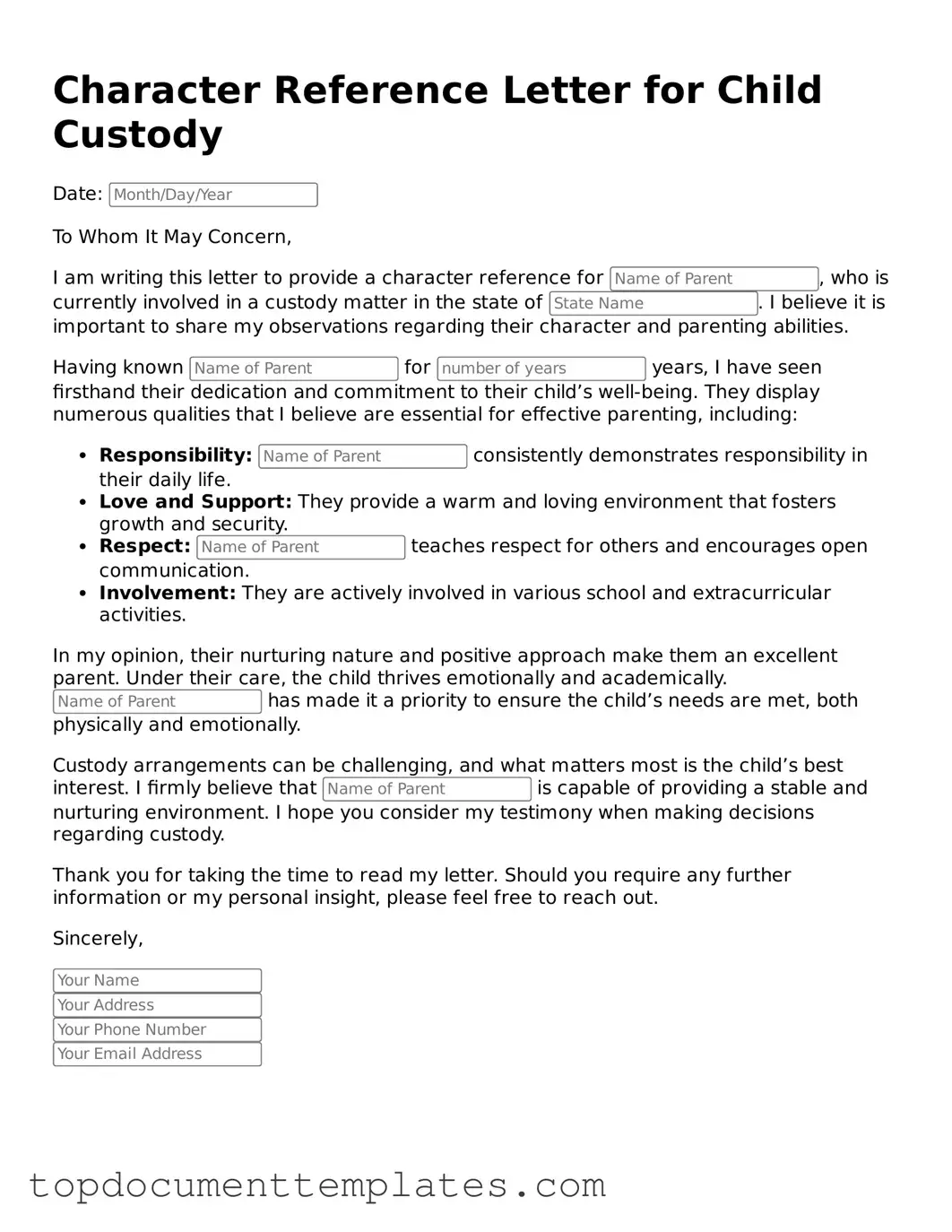Official Character Reference Letter for Child Custody Template
When navigating the sensitive landscape of child custody disputes, a Character Reference Letter can play a pivotal role in influencing the court's decision. This letter serves as a testament to a parent's character, highlighting their suitability for custody by showcasing their parenting skills, emotional stability, and commitment to the child's well-being. It is essential to include specific examples that illustrate the parent’s positive qualities, such as their involvement in the child's life, their ability to provide a nurturing environment, and their support system. The letter should be written by someone who knows the parent well, such as a family member, friend, or educator, and must convey a genuine understanding of the parent’s relationship with the child. Additionally, the format should be clear and organized, typically including an introduction, a detailed body, and a conclusion that reinforces the writer's support for the parent seeking custody. By effectively communicating the parent's strengths and dedication, this letter can significantly impact the court's perception and ultimately aid in achieving a favorable custody arrangement.
Similar forms
- Personal Reference Letter: Similar to a character reference letter, a personal reference letter provides insights into an individual's character and personal qualities. It typically highlights the person's strengths and positive attributes, making it useful in various contexts, such as job applications or volunteer opportunities.
- Professional Reference Letter: This document focuses on an individual's work ethic and professional abilities. Like the character reference letter, it serves to vouch for someone's reliability and competence, often used when applying for jobs or promotions.
- Affidavit of Support: While primarily a legal document, an affidavit of support can also provide a character assessment of an individual. It confirms the writer's willingness to support someone financially or emotionally, similar to how a character reference letter supports a custody claim.
- Testimonial Letter: A testimonial letter shares experiences and opinions about an individual's character or abilities. Like a character reference letter, it aims to provide a personal perspective, often used in legal matters, educational applications, or community service recognition.
Guidelines on Writing Character Reference Letter for Child Custody
Filling out the Character Reference Letter for Child Custody form is an important step in supporting a custody case. This letter can provide valuable insights into the character and capabilities of the individual involved in the custody matter. Follow the steps below to ensure the form is completed accurately and effectively.
- Begin by writing your name and contact information at the top of the letter. Include your address, phone number, and email address.
- Clearly state your relationship to the child and the parent involved in the custody case. Specify how long you have known them.
- Describe the qualities and characteristics of the parent that make them a suitable caregiver. Use specific examples to support your statements.
- Discuss any relevant experiences you have had with the parent and child together. Highlight positive interactions and the parent’s involvement in the child’s life.
- Conclude the letter by expressing your willingness to provide further information if needed. Offer your contact information again for follow-up purposes.
- Sign the letter and date it. Ensure that your signature is legible.
Once the form is completed, it should be reviewed for clarity and accuracy. Submitting the letter to the appropriate party is the next step in the process. Ensure that it is sent in a timely manner to support the custody proceedings effectively.
File Information
| Fact Name | Description |
|---|---|
| Purpose | A Character Reference Letter for Child Custody supports a parent's claim by providing insight into their character and parenting abilities. |
| Content Requirements | The letter should include the writer's relationship to the parent, observations of their parenting, and any relevant personal qualities. |
| State-Specific Forms | Many states do not have specific forms, but guidelines may vary. For example, California Family Code Section 3011 outlines factors considered in custody decisions. |
| Submission Process | The letter is typically submitted to the court during custody proceedings, either directly by the writer or through the parent involved. |
Find Other Types of Character Reference Letter for Child Custody Templates
Sample Letter of Good Moral Character for Immigration - The reference serves to highlight the applicant's contributions to uplifting their community.
A Recommendation Letter form is a document that facilitates the process of requesting and providing endorsements for individuals, often used in academic and professional settings. These letters serve as vital tools, highlighting an individual's strengths, qualifications, and character. Understanding how to properly utilize this form can greatly enhance one’s application or candidacy. For those looking to create a recommendation letter, you can find a useful template at https://fillable-forms.com/blank-recommendation-letter.
Adoption Recommendation Letter - A reflection on the applicant's goal-oriented mindset in parenting.
